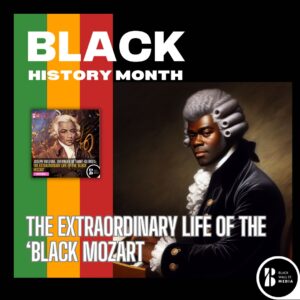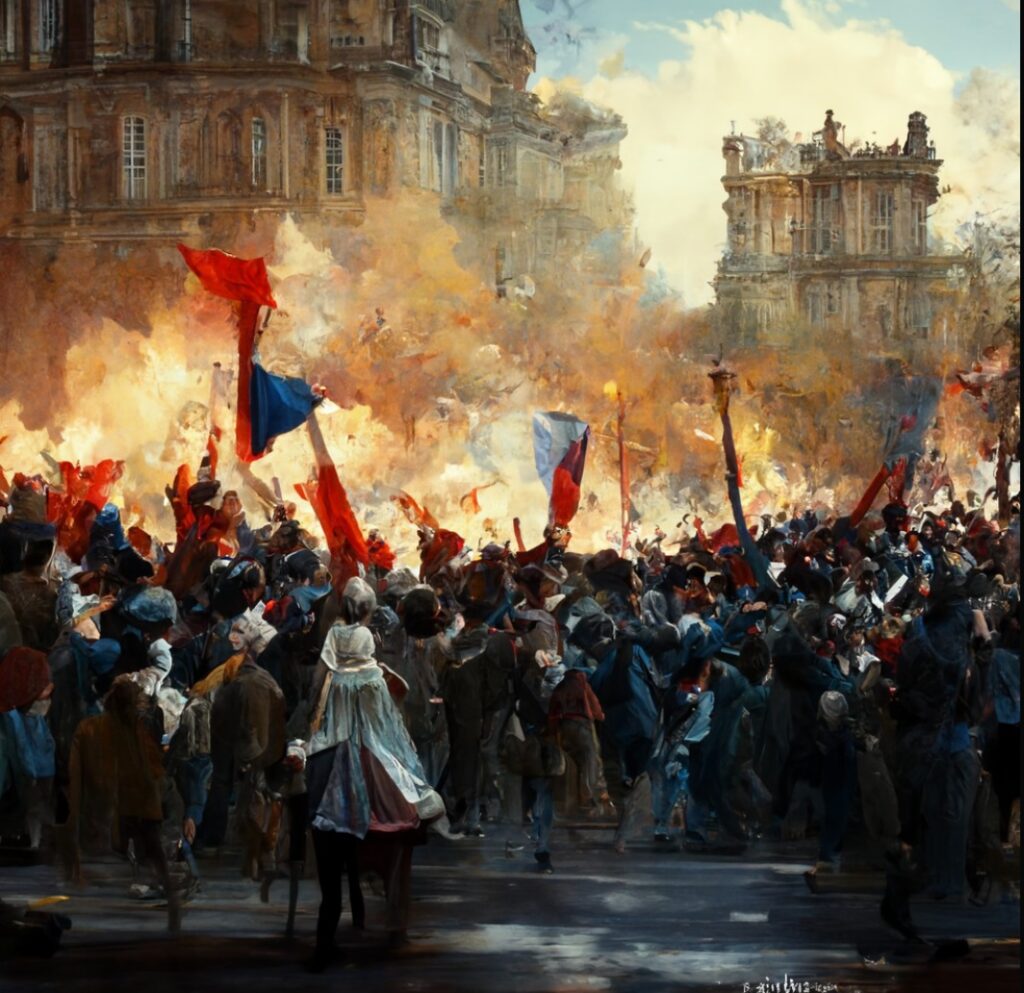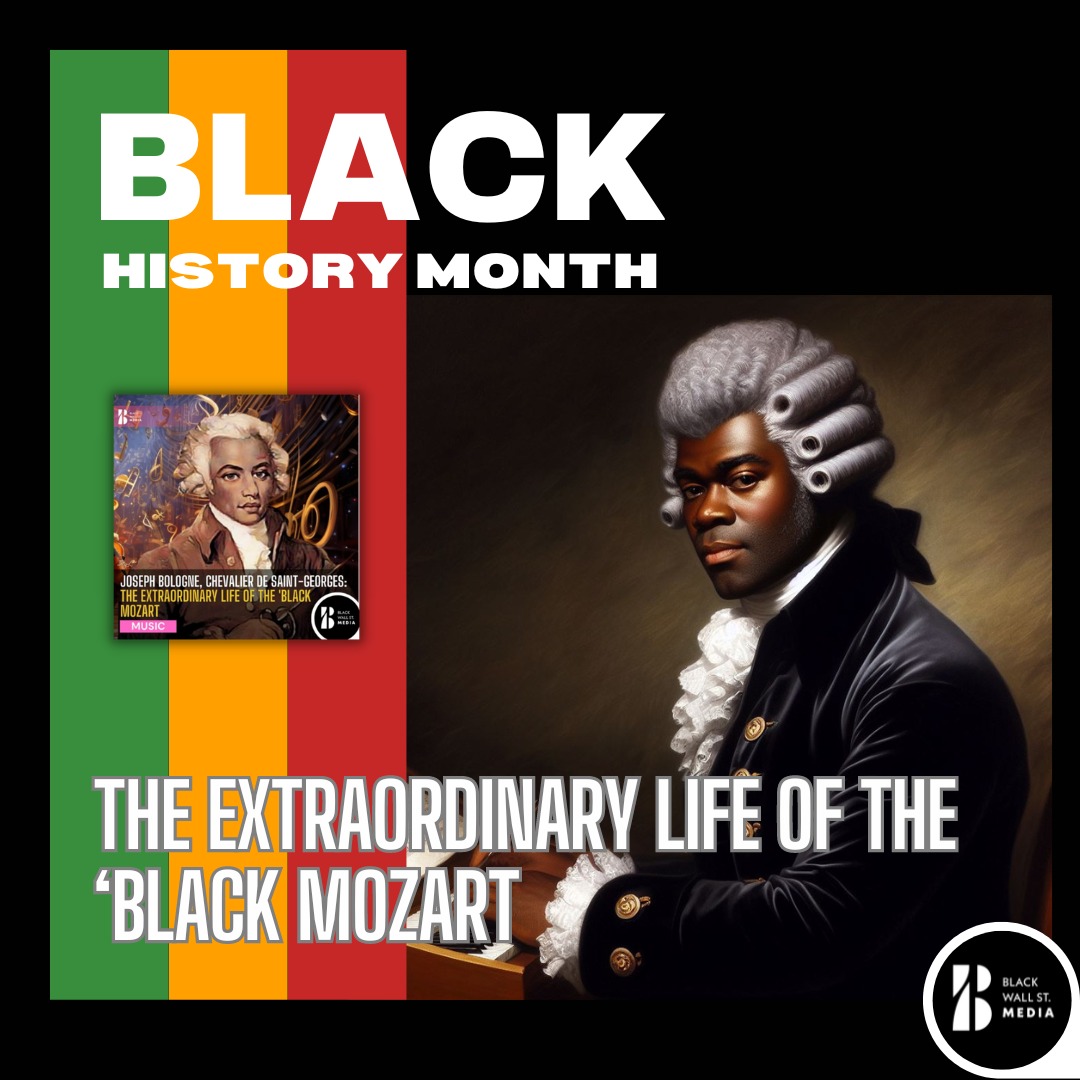MUSICAL HISTORY
The Extraordinary Life of the ‘Black Mozart
“Joseph Bologne, Chevalier de Saint-Georges: A trailblazer whose remarkable talents shattered boundaries and left an indelible mark on history.”
Black Wall St. MediaContributor
Go to bottom go page to read article in French..

The Extraordinary Life of the ‘Black Mozart
Joseph Bologne, Chevalier de Saint-Georges, was an extraordinary individual whose remarkable accomplishments spanned multiple fields.
Born on December 25, 1745, and passing away on June 10, 1799, he left an indelible mark on history as a fencing master, a virtuoso violinist, a renowned conductor, and the first classical composer of African descent.
Saint-Georges’ exceptional skills in fencing were evident from a young age.
At the age of 13, he was accepted into the prestigious Boëssière’s Academy of Fencing and Horsemanship, where he honed his skills with dedication and passion.
By the time he reached 15, he had already surpassed his instructors and consistently defeated them in fencing duels. Regarded as possessing “the greatest speed imaginable” by the age of 17, he was hailed as the finest fencer in all of France in 1762.
Fencing was not only a sport for Saint-Georges; it became a means of defending himself and his city.
Throughout his life, he faced two assassination attempts, both of which he miraculously survived.
He also played a pivotal role in defending Paris against the Austrian Army during the French Revolutionary War, showcasing his exceptional skills as a military leader and swordsman.
Despite his remarkable achievements in fencing, it is Saint-Georges’ contributions to the world of music that have garnered him the most recognition.
Often referred to as “The Black Mozart,” he predates Wolfgang Amadeus Mozart by over a decade.
As a composer, his musical talent knew no bounds.
His compositions encompassed a wide range of genres, including symphonies, chamber music, operas, and concertos.
Saint-Georges’ compositions were hailed for their elegance, creativity, and technical brilliance, earning him a place among the greatest composers of his time.
As a violinist, Saint-Georges was celebrated for his virtuosity and expressive playing style.
He captivated audiences with his performances, earning the admiration and respect of his contemporaries.
His talents as a conductor were equally remarkable, and he held the position of conductor for Paris’ leading symphony orchestra, the Concert des Amateurs.
Under his leadership, the orchestra flourished, solidifying his reputation as a musical genius.
However, Saint-Georges’ talents extended beyond the realms of fencing and music. He was an accomplished athlete, excelling in various disciplines.
He was an exceptional runner, possessing great speed and agility. Additionally, he displayed incredible marksmanship as a pistol shooter.
To maintain his physical fitness, he would swim across the Seine river, utilizing only one arm for cardiovascular training.

During the tumultuous era of the French Revolution, Saint-Georges made significant contributions as a military leader.
He rose through the ranks, from Captain to Colonel, and eventually commanded the “Legion de Saint-Georges.”
This distinguished unit was the first-ever all-black military unit to serve in a European army.
Composed of soldiers from the French province of Saint-Domingue (present-day Haiti), the Legion de Saint-Georges played a vital role in the French Revolutionary Wars.
Notably, Saint-Georges’ second-in-command in the Legion de Saint-Georges was Lieutenant-Colonel Thomas-Alexandre Dumas, a remarkable figure in his own right.
Dumas, also known as “The Black Devil,” earned his nickname through his fearless and valiant exploits on the battlefield.
Both Saint-Georges and Dumas shattered racial barriers and defied the limitations imposed by society, leaving an indelible legacy for generations to come.
Joseph Bologne, Chevalier de Saint-Georges, was a trailblazer in every sense of the word.
His extraordinary talents as a fencer, violinist, composer, and military leader continue to inspire and captivate audiences around the world.
His unwavering dedication to his craft, coupled with his indomitable spirit, serves as a testament to the power of determination and the pursuit of excellence.
Saint-Georges’ legacy stands as a shining example of the heights that can be achieved by breaking barriers and embracing one’s true potential.
Black Wall St. MediaContributor
Joseph Bologne, Chevalier de Saint-Georges, était un individu extraordinaire dont les réalisations remarquables ont touché plusieurs domaines.
Né le 25 décembre 1745 et décédé le 10 juin 1799, il a laissé une marque indélébile dans l’histoire en tant que maître d’escrime, violoniste virtuose, chef d’orchestre renommé et premier compositeur classique d’origine africaine.
Les compétences exceptionnelles de Saint-Georges en escrime étaient évidentes dès son plus jeune âge. À 13 ans, il a été accepté à la prestigieuse Académie d’escrime et d’équitation de Boëssière, où il a perfectionné ses compétences avec dévouement et passion.
À l’âge de 15 ans, il avait déjà dépassé ses instructeurs et les battait régulièrement lors de duels d’escrime. Considéré comme possédant “la plus grande rapidité imaginable” à l’âge de 17 ans, il a été acclamé comme le meilleur escrimeur de toute la France en 1762.
L’escrime n’était pas seulement un sport pour Saint-Georges ; c’était un moyen de se défendre lui-même et sa ville.
Tout au long de sa vie, il a fait face à deux tentatives d’assassinat, qu’il a miraculeusement survécu.
Il a également joué un rôle essentiel dans la défense de Paris contre l’armée autrichienne pendant la Révolution française, mettant en valeur ses compétences exceptionnelles en tant que chef militaire et escrimeur.
Malgré ses réalisations remarquables en escrime, ce sont les contributions de Saint-Georges dans le monde de la musique qui lui ont valu le plus de reconnaissance. Souvent appelé “le Mozart noir”, il précède Wolfgang Amadeus Mozart de plus d’une décennie. En tant que compositeur, son talent musical ne connaissait aucune limite.
Ses compositions englobaient un large éventail de genres, notamment des symphonies, de la musique de chambre, des opéras et des concertos. Les compositions de Saint-Georges étaient saluées pour leur élégance, leur créativité et leur brillance technique, ce qui lui a valu une place parmi les plus grands compositeurs de son époque.

Pendant l’ère tumultueuse de la Révolution française, Saint-Georges a apporté d’importantes contributions en tant que chef militaire.
En tant que violoniste, Saint-Georges était célébré pour sa virtuosité et son style de jeu expressif.
Il captivait les audiences avec ses performances, gagnant l’admiration et le respect de ses contemporains.
Ses talents de chef d’orchestre étaient tout aussi remarquables, et il occupait le poste de chef d’orchestre pour le principal orchestre symphonique de Paris, le Concert des Amateurs.
Sous sa direction, l’orchestre prospérait, solidifiant sa réputation de génie musical.
Cependant, les talents de Saint-Georges s’étendaient au-delà des domaines de l’escrime et de la musique.
Il était un athlète accompli, excellent dans diverses disciplines.
Il était un coureur exceptionnel, possédant une grande vitesse et agilité.
De plus, il faisait preuve d’une précision incroyable en tant que tireur d’élite au pistolet. Pour maintenir sa forme physique, il nageait dans la Seine en utilisant seulement un bras pour l’entraînement cardiovasculaire.
Pendant l’époque tumultueuse de la Révolution française, Saint-Georges a apporté d’importantes contributions en tant que chef militaire.
Il a gravi les échelons, passant du grade de capitaine à celui de colonel, et a finalement commandé la “Légion de Saint-Georges”.
Cette unité distinguée était la première unité militaire entièrement composée de soldats noirs à servir dans une armée européenne.
Composée de soldats de la province française de Saint-Domingue (aujourd’hui Haïti), la Légion de Saint-Georges a joué un rôle vital dans les guerres révolutionnaires françaises.
Il est à noter que le bras droit de Saint-Georges dans la Légion de Saint-Georges était le lieutenant-colonel Thomas-Alexandre Dumas, une figure remarquable en lui-même.
Dumas, également connu sous le nom de “Le Diable noir”, a mérité son surnom grâce à ses exploits courageux et vaillants sur le champ de bataille.
Saint-Georges et Dumas ont tous deux brisé les barrières raciales et défié les limitations imposées par la société, laissant un héritage indélébile pour les générations à venir.
Joseph Bologne, Chevalier de Saint-Georges, était un pionnier en tous sens du terme. Ses talents extraordinaires en tant qu’escrimeur, violoniste, compositeur et chef militaire continuent d’inspirer et de captiver les audiences du monde entier.
Sa détermination inébranlable à son art, associée à son esprit indomptable, témoigne du pouvoir de la détermination et de la poursuite de l’excellence.
L’héritage de Saint-Georges est un exemple éclatant des sommets qui peuvent être atteints en brisant les barrières et en embrassant son véritable potentiel.











